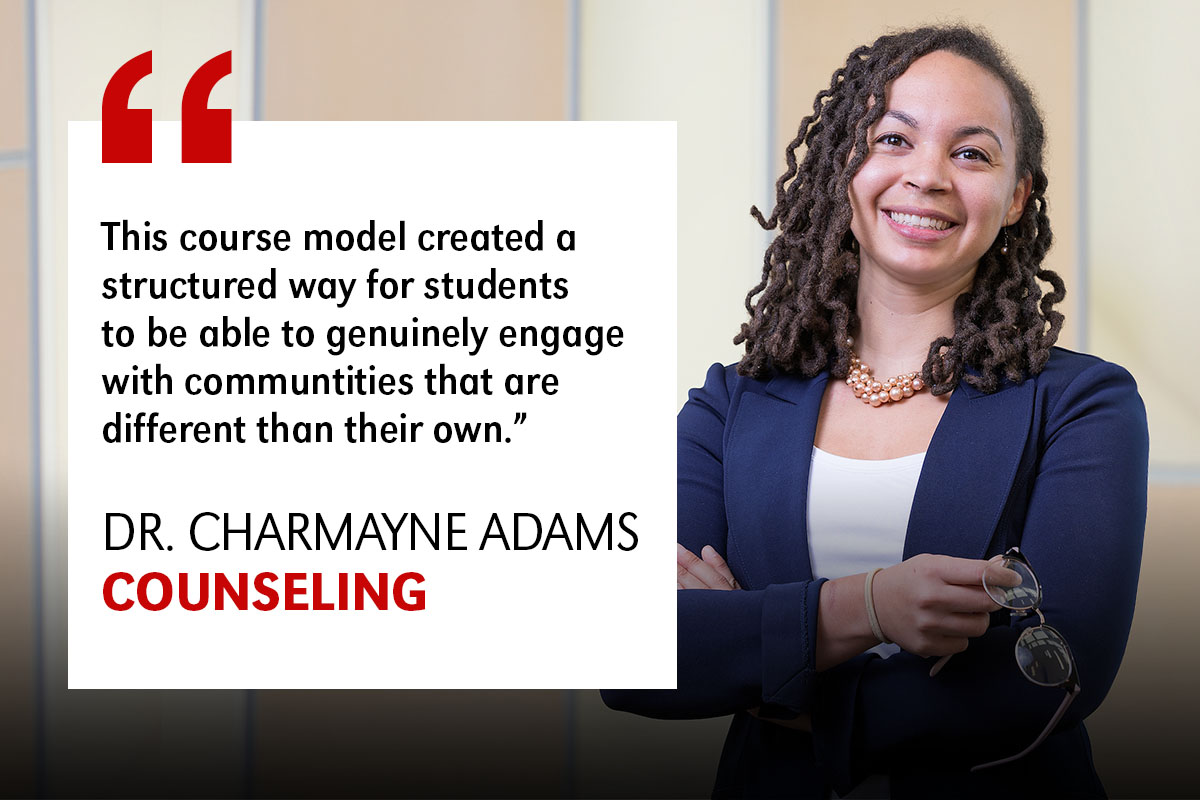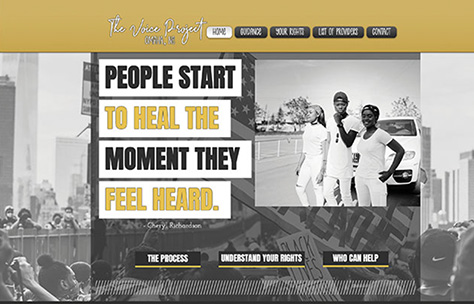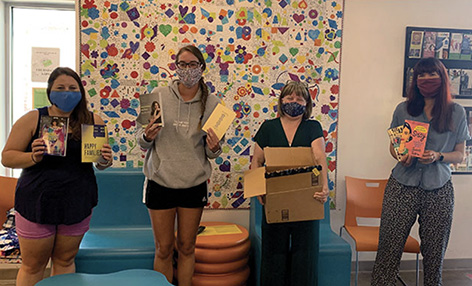A Foundation for Advocacy
- contact: College of Education, Health, and Human Sciences
- email: unocehhs@unomaha.edu

As the U.S. faces ongoing challenges around issues of inequity, students in the Department of Counseling are developing advocacy skills while making a direct impact on the Omaha community through a newly reimagined course.
"In counseling, we do all different types of advocacy work," said Assistant Professor Dr. Charmayne Adams, who developed the new model for Multicultural Counseling, a course required for all students in the first or second semester of the Counseling program.
"We do one-on-one advocacy work when we’re with a client who has a specific issue like setting boundaries or going for a promotion. We advocate on a public platform by informing legislators who are working to pass laws. Sometimes we advocate if we see a specific group that has a need, but I think that’s a real struggle for students—trying to engage with communities that are different from us. How do we do that in a way that feels genuine and not imposing or performative? This course model creates a structured way for students to do that."
Multicultural Counseling was designed to encourage students to immerse themselves in diverse communities different from their own, but the course had previously involved more self-directed learning. Dr. Adams revamped the course model to emphasize servant leadership, the foundation of advocacy work.
Dr. Adams assigned each student to a small group, and the groups researched and developed advocacy projects designed to serve a marginalized community--either the Latinx Community; Individuals with Disabilities; the African American community; the Indigenous community; the Transgender community; or the Queer community.
"Over the six weeks, it became the students' job to form relationships with the community, to reach out and see what’s already being done," explained Dr. Adams. "The first step was creating a statement of the problem, so they researched and listened to discover a current issue this marginalized community is facing and ask: do I have the resources and time to address it?"
Supporting the Latinx Community was Kate Williams' group's objective. Kate's group connected with the Latino Center of the Midlands, and by spearheading a Facebook fundraiser, provided wellness kits to support the Center's clients through pandemic-related isolation and anxiety.
"This particular course really honed in on understanding how ethnic, racial, and cultural diversity affects mental health, and how we as future counselors can be mindful and respectful in our interaction," explained Kate.
"For me, this course served as the baseline to remind us how important it is to incorporate an individual's complete identity into a therapeutic process, and how equally important it is to read, research, ask questions, and be aware of how much we don't know. Being open to new information, especially information that may contradict our own worldview and give us a broader view of the world, is the key to positive, interactive human connection."
"Dr. Adams' class showed me the power of communication with not only my classmates, but also individuals within the community. It takes everyone to make change, and this project really exemplified that."
While the students were building their advocacy projects, they were learning to effectively collaborate in a group and engage with the community.
Dr. Adams adds, "Because we were meeting remotely, I would pop into their breakout rooms and check in, helping them navigate how to best approach the communities so it didn’t feel like we were coming in and saving someone. This is a concept called cultural humility, which we use a lot in the class—we have to be really intentional to not assume what the needs are, especially with the communities we don’t belong to. So, learning to be intentional about serving in a really genuine way."

Dylan Campbell's group worked to support the African American community by building a website, The Voice Project, with information about the counseling process and a directory of African American mental health providers.
"Dr. Adams' class showed me the power of communication with not only my classmates, but also individuals within the community. It takes everyone to make change, and this project really exemplified that," said Dylan.
Dr. Adams was impressed with the depth of the projects and what the students achieved over the six-week time frame. "The mantra throughout the class was, 'Advocacy is hard!' I am proud of the amount of good they did for the community in just six weeks. They pushed themselves to make real, sustainable change."

THE PROJECTS
- Raised $360 for the Latino Center of the Midlands to fund mental health support kits.
- Built a website, The Voice Project, a directory of African American counselors in the Omaha community.
- Raised $600 to purchase books that celebrate the identity of transgender characters in literature for youth served by Youth Emergency Services (YES).
- Created a website for families with children with autism to support the transition into an uncertain school year.
- Worked with school counselors to create fliers in both English and Spanish with resources for queer students and allies.
- Launched an Instagram account for use by the Nebraska Urban Indian Health Coalition.